Menu
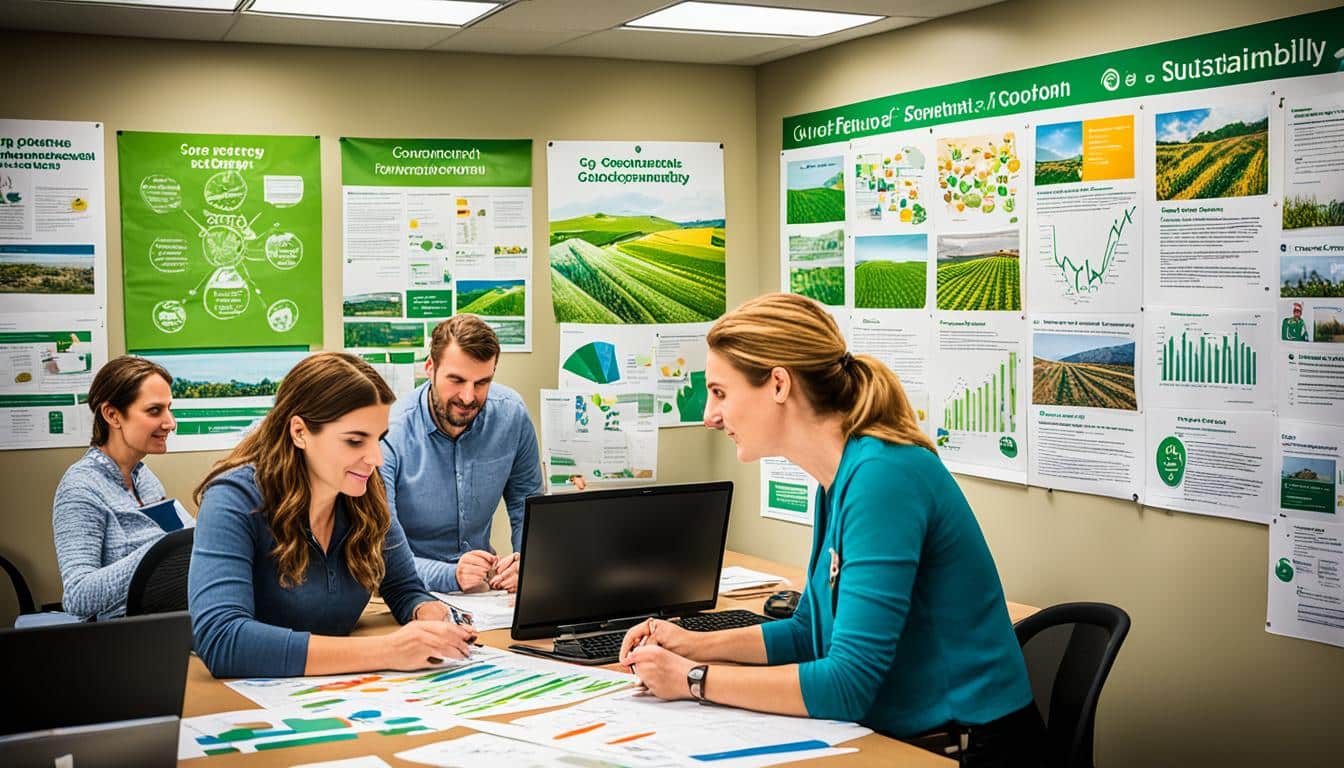
More than 23 percent of U.S. farmer cooperatives have lasted over a century. This shows their ability to stay sustainable and resilient. As climate change and harm to the environment grow, these groups are working harder for the planet. They use their strong communities and teamwork to make farms greener. They follow eco-friendly rules together.
Farm cooperatives are a big part of making farming sustainable. A report on Chinese co-ops found that, because the members rely on each other, they make green plans that fit their specific places.
These co-ops follow the Brundtland Report’s idea of balancing profit, society, and environment. They help reduce how much farming damages nature. They offer cheap services like housing and food, which also help their farms be eco-friendly.
Joining a co-op doesn’t need a lot of money at first, but it can become more valuable as time goes on. It’s good for new farmers as it helps save money and keep the environment safe as rules change.
Farm cooperatives are key to good farming practices that don’t harm the land. They mix money-making with looking after the planet’s health. To really get how they work, we need to dig into their rules and how they’ve grown over time.
A ‘farm cooperative’ is a group of farmers working together, laid out by the Chinese Farmer Specialized Cooperative Law in 2007. It shows how these groups can thrive in China’s farming world. These cooperatives must think about the environment in everything they do because farming influences nature a lot.
This starts with firm rules on how to farm smartly. This feeds into a big push for farming that’s kind to the earth, promoting what we call eco-friendly farming.
Looking back, we see farm cooperatives have grown a lot. They used to mainly help farmers make more money. Now, they also care about the land and sea. This change is key. It shows why caring for the environment is a big part of what they do.
Understanding their journey helps see why being green is now at the core of their work.
| USDA Farm Bill Benefits (1997-2007) | USD Value Range |
|---|---|
| Overall Value Subject to Environmental Compliance | $11.7 billion – $27.3 billion |
| Funding Components | USD Value/Year |
| Direct Payments | $5 billion |
| Environmental Compliance Statistics | Percentage |
| Share of cropland covered by Direct Payments | 71% |
| Decrease in spot-checks on farms (1993-2006) | From 1.2% to 0.6% |
Learning about the past of these groups shows why they’re now all about being green. It’s about matching money with caring for the planet. This mix is what guides them today.
Farming groups face big environmental issues that affect their work a lot. These include changing climates that make it hard to predict weather. This messes up growing crops and looking after animals.
The changing climate is a big problem for farming groups. With weather getting more unpredictable, it’s tough to grow crops and keep animals. Farmers are trying to pick hardy crops and better ways to water them to cope.
Recent studies show that good environmental rules help farms do better. They help by making sure farming doesn’t hurt the environment too much. They point to the importance of smart policies for long-lasting farming success.

Using smart rules can really make a difference for farms. These can be making sure farmers use the land in a way that’s good for nature. They also talk about the benefits of good plans and support from the government to help farmers.
Water is a huge deal for farming, but it often gets polluted. This is not good for growing food and looking after animals. So, farmers need to find ways to farm that don’t harm the water.
One claim is that farming a lot of land can help ease up on these rules. This highlights how working together can lead to better, less harmful farming. The key is to ensure people living in the countryside make enough money while tending the land well.
Doing this also keeps nature happy. It means finding a balance between growing food well and looking after the environment well. The study suggests paying farmers to do this right, instead of making them pay for bad farming.
To succeed today, farm cooperatives must embrace sustainable practices. These methods ensure the farms will be productive for a long time. They also keep the environment in balance.
One key to success is using organic methods. This means not using man-made chemicals on plants or soil. It keeps the farm healthy, helps nature thrive, and keeps the soil rich for the future.
Dealing with pests is important without harming the environment. By using many methods together, like friendly bugs and traps, pests are controlled naturally. It also means less use of harmful sprays, making the farm a safer place.
Rotating crops keeps the soil in good shape. It stops the soil from getting tired and helps plants grow better. This method helps the farm be strong against problems like bad weather. It’s good for the soil, the crops, and the farm.
Farm cooperatives have a tough job with environmental rules. They must follow strict regulations. These are vital for keeping the environment healthy. They also encourage farms to use sustainable methods.
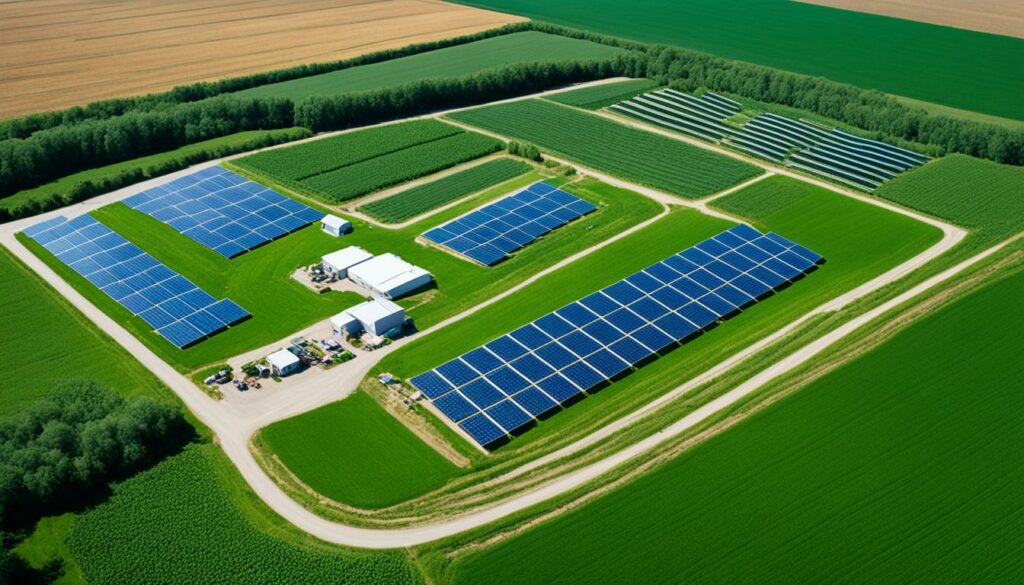
Governments are key in making sure farm co-ops stick to environmental rules. In the United States, 34% of farm co-ops meet these green standards. Countries around the world use these rules to support eco-friendly farming. Support payments, sometimes worth millions, depend on farmers meeting these standards. This link between farming and the environment is very important.
To make sure farm cooperatives follow the rules well, we need good systems in place. These include:
One interesting part of keeping an eye on farms is the way support changes by farm size. This affects how well they follow the rules. Also, countries like those in the EU and Switzerland use different methods. This helps everyone learn how to do better.
| Year | Country | Support Measures (Area Participation) | Support Measures (Livestock Participation) |
|---|---|---|---|
| 1999 | United States | Noted | Recorded |
| 2005 | EU | Highlighted | Recorded |
Making sure farm cooperatives keep to green rules is not just a legal need. It’s our duty to protect the environment for those who come after us.
Green farming laws have led to impressive results in China’s farm cooperatives. These farm groups have followed new agricultural and environmental rules well. This shows a strong example of doing farming in a more eco-friendly way.
In China, farmer cooperatives have tackled several challenges head-on. They looked at issues like low prices, hard conditions for farming, and growing costs. More than a thousand cooperatives joined together to find ways to make things better. They showed their commitment to keep improving their work.
For, example, when facing low prices and high costs, certain cooperatives started using greener farming methods. These methods helped them to farm in a way that’s better for the planet. The Chinese cooperatives’ success comes from choosing eco-friendly ways to work.
Europe also has successful farm cooperatives. These cooperatives do well both economically and in protecting the environment. They deal with issues like the need for workers, not making enough money, and using new technologies.
Cooperatives in Europe are successful in cutting down food waste. In Canada, efforts to reduce kitchen waste and adjust portion sizes showed a big improvement. Actions like these reflect the cooperative’s aim to be kinder to the planet. These efforts, along with long-term goals, show how farm cooperatives can benefit everyone.
| Region | Key Areas of Focus | Outcomes |
|---|---|---|
| China | Low Commodity Prices, Agricultural Economy, Operational Difficulties, Increasing Costs | Effective Adaptation to Agricultural Reforms, Enhanced Environmental Compliance |
| Europe | Labour, Low Margins, Technological Advancements | Integrated Eco-Friendly Practices, Strategic Reduction in FLW |
Farm cooperatives bring many benefits to rural areas by following green rules. These groups help make sure farming doesn’t hurt the land. They care for the environment while also helping communities grow.
Using green farming methods boosts the economy in big ways. It makes farms more efficient without hurting nature. China has 2.2 million such groups, helping many rural families.
Sustainable farming also means more money and steadiness for country people. It improves how land is used, making farming better. This way, farmers sell more and find better markets, which makes villages stronger.
| Benefit | Description |
|---|---|
| Increased Income | Farmers earn more by selling higher quality products and finding better markets. |
| Market Stability | These groups help keep the market steady, so prices aren’t always changing. |
| Resource Efficiency | They use methods that save resources, making farming less expensive. |
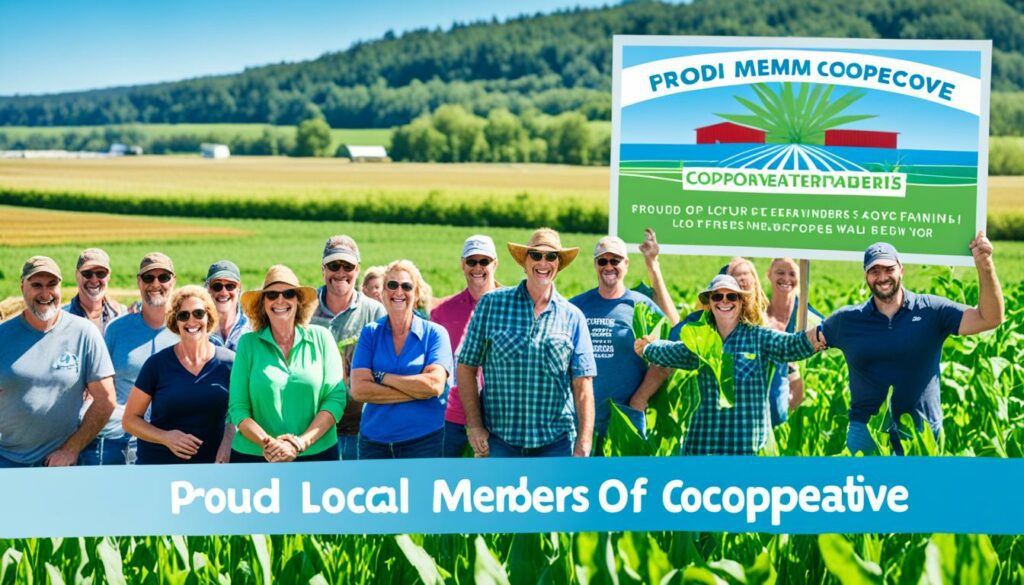
Green farming offers more than money, it builds strong, united communities. It makes farmers work together better. This helps everyone and the land they farm.
These groups also bring new tech and knowledge to farms. In places like the Tarim River Basin, farmers in cooperatives work well together. This is key for a peaceful countryside.
Creating new, smart farming rules and supporting big farming projects are crucial. They help keep village life good and village economies strong. This way, everyone enjoys a better life in the countryside.
Technological advances are changing the way farm cooperatives achieve their green targets. Important innovations include precision farming and data analysis. These tools boost efficiency and ensure green farming practices.
Precision farming tools help cooperatives use resources better, improving how they work. The story of the Oromia Coffee Farmers Cooperative Union (OCFCU) is a great example. By going digital, OCFCU helped 600,000 coffee farmers. It improved efficiency, built trust with buyers, and made managing data easier. The tools are changing the game for these farmers.
Using data for environmental goals is vital for farm cooperatives. AgUnity offers digital tools that make things easier. Its apps help with work on the farm and ensure things are done fairly. By working with AgUnity, cooperatives can take control of their data. This makes digital transformation fair for farmers.
Data analysis is key for keeping farms green. It lets cooperatives spot problems fast and stick to green rules. This early work helps keep the environment safe. It also makes sure farming continues to be green for years to come.
| Technology | Benefit |
|---|---|
| AgUnityData Farm | Streamlines data handling ensuring full data ownership |
| AgUnityField Apps | Enhances monitoring and transparency in operations |
| AgUnityCo-op Manager | Facilitates compliance by coordinating cooperative activities |
| Tracingly | Ensures traceability and integrity of agricultural products |
| Cropslist Marketplace | Improves access to markets through digital platforms |
For farm cooperatives to meet environmental rules, it’s key for directors to learn a lot and set strong policies. Directors need to lead in eco-friendly ways, follow laws closely, and encourage green farming.
Programmes that educate and train are very important for directors. Training should teach about care duties, loyalty to the business, and how to deal with legal issues, found on pages 12-22 of fiduciary duties guidelines. This continued learning helps directors know their jobs better, reducing mistakes and fraud.
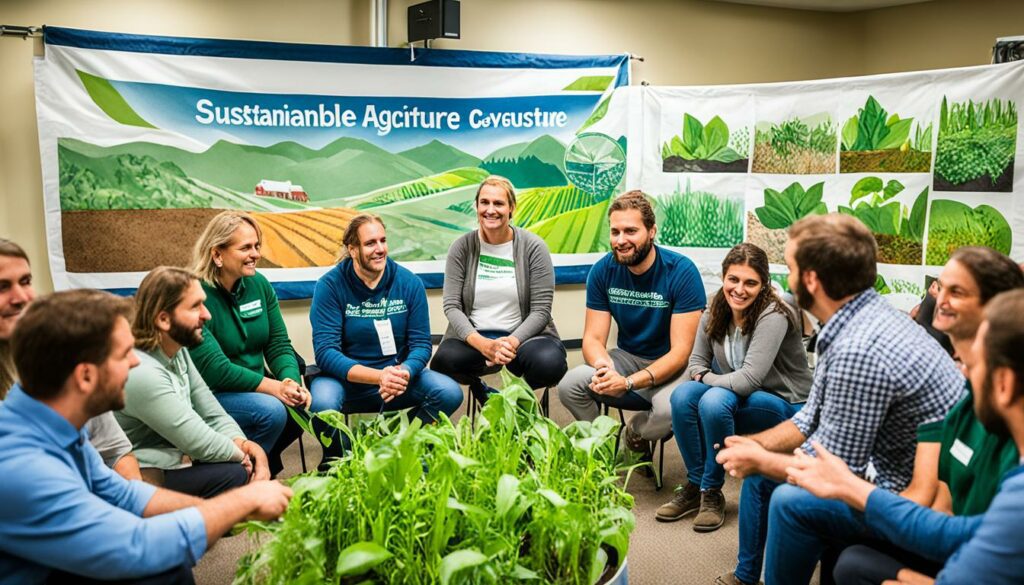
Reading about the “Cooperative Difference” (pages 30-41) helps. Knowing how cooperatives are created and understanding antitrust laws is good. It’s also vital to learn about legal limits on liability (pages 53-54) to avoid risks.
| Aspect | Importance |
|---|---|
| Duty of Care | Ensures directors act in the best interests of the cooperative, avoiding negligence. |
| Duty of Loyalty | Maintains directors’ commitment to the cooperative, preventing conflicts of interest. |
| Business Torts | Addresses issues like fraud, ensuring transparent and ethical management. |
Developing good policies is key to farming in eco-friendly ways. Page 46-48 of some texts offer advice about securities. It’s also wise to check USDA publications and cooperate with centres and councils to make sure policies meet legal and environmental targets.
Directors should take a strategic approach, including:
These actions help cooperative directors lead in making farms both safe and eco-friendly.
It’s key to develop a culture of sustainability in farm cooperatives. This helps in using eco-strategies for the long run. By adopting sustainable agriculture, farm cooperatives can ensure a healthy environment, make money, and promote fair practices.
After World War II, agriculture changed a lot. Now, a small number of farmers produce most of the USA’s food and cloth. This shows why it’s vital to focus on green farming. Everyone involved must work together to care for the environment and make sure farming stays profitable. Switching to sustainable farming means starting with small, doable steps.
Farmers are working on better water use to fight off droughts and to stop pollution in the water. Tackling these issues needs teams from different fields, such as researchers and educators. They join forces to push for eco-friendly farming.
Take the Northeastern State University, for example. They gave over $250,000 to teach young people about conserving nature. Then, there’s the Urban Transformation Network, which backed a $1,000,000 project for better farming in the Chicago area. Efforts like these show a big push towards farming that looks after our planet.
Other actions to embed sustainability in farming include helping veteran farmers or supporting new ways to grow food. These undertakings aim at making agriculture kinder to the environment. By focusing on long-lasting eco-strategies, they greatly help in making farming more sustainable and friendly to nature.
Farm cooperatives face many legal hurdles in doing the right thing for the environment. They need to understand and use good legal strategies. This helps them not only survive but also grow.
Since 1922, the Capper-Volstead Act gives some freedom to farm groupings. It lets them work together on certain aspects like setting prices and joint marketing. But, they still need to follow certain rules about how they do this.
Fights over these rules can get complex and take a long time to sort out. So, it’s really important for those leading farm cooperatives to be careful. They must make sure everyone in the cooperative knows how to avoid breaking these rules.
Over time, the laws about groups of farms working together have become very detailed. This shows why farmers and their advisors need to be experts in this area. This advice is crucial for avoiding big problems with the law.
It’s essential for farmers to always follow the Capper-Volstead Act. If they don’t, they could face big legal troubles. This shows how crucial it is to handle the law surrounding farming co-operatives correctly.
| Challenges | Strategies |
|---|---|
| Antitrust Regulations | Consult with legal experts well-versed in cooperative law |
| Fact-Intensive Disputes | Ensure comprehensive understanding and documentation of all activities |
| Compliance with Capper-Volstead Act | Regular training for managers and directors on legal guidelines |
In sustainable farming, the help of cooperative members is key. Their work on environmental goals means every member works together to make a cleaner planet. They play a big part in the cooperative’s promise to protect our planet by leading initiatives that help our environment.
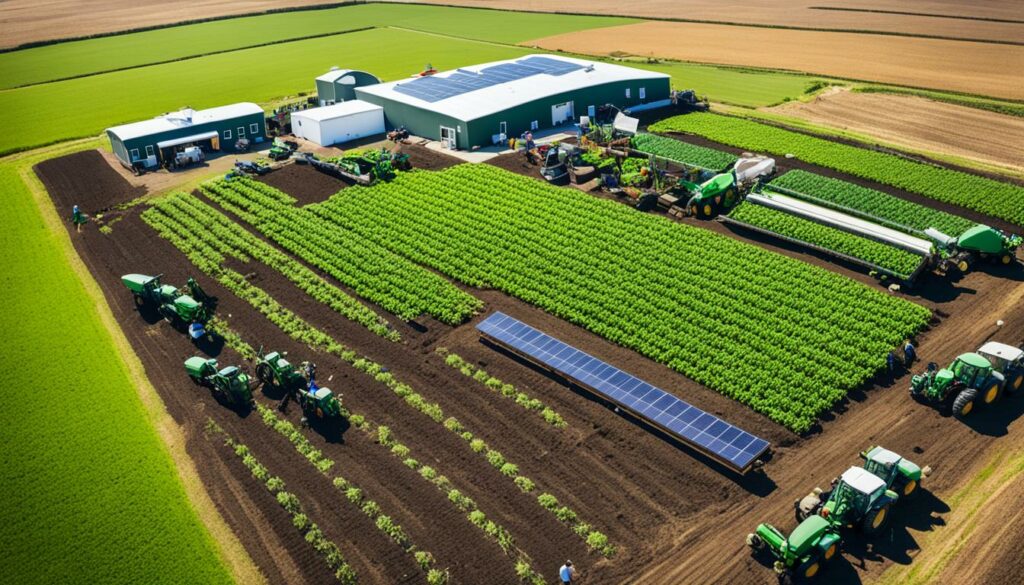
It’s not just about money. Members of the cooperative bring essential environmental knowledge, making farming methods more eco-friendly. Studies show that cooperatives help local economies grow, keeping food money in the community. This helps the economy become stronger. By using eco-friendly methods, members increase the cooperative’s good work, benefiting more than just their farms.
Cooperatives also do a lot to help the community and the environment. They give resources to local farming, raise money, and teach people for free. These actions show the cooperative’s effort to be green and build stronger community ties.
Members’ work in meeting food safety rules is vital. Following these rules means food is safe and good for people to eat. The USDA’s high food safety rules are proof of how important these rules are for cooperatives.
Members also follow laws like the FQPA and PACA for safer food production. These laws make sure that everything the cooperative does is safe and fair.
“One member, one vote” is at the heart of how cooperatives make decisions fairly. This democratic way ensures all have an equal voice. It creates a community where caring for the environment is a shared goal. Farmers get good prices and earth-friendly materials. This helps them make top-notch products while using fewer resources.
Cooperatives also push for new farming technology, making the work easier and more efficient. This mix of old and new farming methods is a win for everyone. Members can help the environment more effectively.
In the coming years, the future of farm cooperatives environmental compliance will change a lot. This change will be because of new global environmental standards in agriculture. It’s also due to more cooperative partnerships for sustainability. Farming is entering a new, eco-friendly era thanks to these developments.
The need for better environmental rules in farming is clear. This is because the world’s population is growing. Companies like Mothive, part of Terra Prima Group, are making big moves. They have tech that cuts crop waste and boosts food production by 21%.
Agrocares is also making tools that check soil health online. This helps farmers use nutrients better, making farming more precise. All of these new tools show us that farming’s rules are changing. They’re moving towards ways that are better for the planet.
Building strong global cooperation and partnerships is key for farming’s future. Agreena is one example. They check and trade carbon credits. This encourages farmers to care for the land better.
reNature helps farmers switch to using trees in their fields. This is good for the land and the air. MyEasyFarm makes tools that track greenhouse gases from farms. Such partnerships are making sure farming meets high environmental standards.
Farms around the world are spending a lot on new tech. They’ve put in over $6.7 billion in farm tech. Just in 2021, they’ve spent another $1.9 billion. Agcurate, for example, uses satellite pictures and smart computers to make farming info clearer. This helps farmers get loans and insurance easier.
| Company | Innovation | Impact |
|---|---|---|
| Mothive | Farm solution that reduces crop waste | Improves food production by 21% |
| Agrocares | Cloud-based nutrient monitoring tools | Enables precision farming |
| Agreena | Verifies and sells carbon credits | Incentivises regenerative agriculture |
| reNature | Supports transition to agroforestry | Promotes sustainable systems |
| MyEasyFarm | Monitoring GHG emissions | Complies with low-carbon label |
These upcoming changes highlight the big role of new environmental and partnership rules in farming. Embracing these changes will help farm cooperatives a lot. They’ll meet the big goals of worldwide farming sustainability.
Farm cooperatives play a key role in following environmental rules and pushing for sustainable farming. They face many tough challenges like low prices, how to run their farms, and economic ups and downs. The weather was a big worry about the future but cooperatives are tackling these issues well.
Marketing cooperatives and farm supply groups face tough times due to competition and money problems. They’re working hard to deal with costs and slim profits. Meanwhile, related-service cooperatives are shifting towards more economic stability. They are not just worried about the weather and problems finding workers anymore.
We looked at information from over 1,100 cooperatives. They all seem to have similar big issues but are determined to overcome them. The method we used highlighted both common problems and those that are less common but very important.
This thorough approach makes sure no problem is overlooked. It helps in coming up with strong plans for sticking to environmental rules. Summing up, the strategies of farm cooperatives show how closely linked the economy, society, and our environment really are.
The future for these eco-cooperatives looks bright. They could lead us into a new phase of farming that’s all about being part of the environment and still making a living.
Farm cooperatives are key in making sure farms follow green rules. They lead in using ways that protect the earth. This helps farming to do well without harming the planet.
Farm cooperatives help farms become more eco-friendly by working together. They share green ideas, tools, and skills. This way, they can farm in ways that care for nature.
Farm groups tackle issues like climate changes and water misuse. These issues can harm the land. So, cooperatives work to farm in ways that stop these problems.
They use natural ways to farm without harmful chemicals. They also plan smart ways to fight bugs that don’t hurt the land. Plus, they choose special ways to rotate crops to keep the soil healthy.
The government sets rules to make sure farms are eco-friendly. These rules help farmers learn and get money to do things right. They also make sure farms stick to green plans.
For example, farm groups in China follow new eco rules well. In Europe, farms have become very green by working together. They help the earth and each other this way.
Farm groups that follow green rules help the countryside. They make money in ways that don’t hurt the earth. This helps everyone live and work in a better place.
High-tech farming tools help farms use resources better. They also watch over the farm to make sure it’s green. This way, farms can work well and protect the earth.
Farm leaders should teach members how to farm in eco-friendly ways. They should also make and follow rules that help the earth. This makes sure farms are good for nature and business.
By getting all members to care for the earth in everything they do. They should work to keep the farm eco-friendly. This will make the group strong and the land healthy for the future.
They follow both the law and care for the earth as much as possible. They use good plans to make sure they do well in keeping the land safe. This helps to be good farmers and good neighbours.
Members must take part in green farming. By working together, they make a big difference. Being committed is crucial for the farm and the community’s future.
Farms will get more eco-friendly by setting up new green rules. They will work with others worldwide to help the earth. Farming will change to be better for the planet, everywhere.